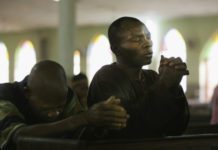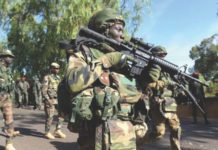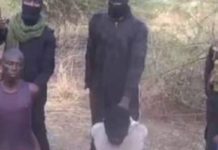By BosNewsLife Africa Service
 KHARTOUM, SUDAN (BosNewsLife)– Christians in Sudan urged prayers Friday, June 8, amid concerns about 14 evangelical leaders and other Christians who were detained in Bahri, the country’s third largest city, sources told BosNewsLife.
KHARTOUM, SUDAN (BosNewsLife)– Christians in Sudan urged prayers Friday, June 8, amid concerns about 14 evangelical leaders and other Christians who were detained in Bahri, the country’s third largest city, sources told BosNewsLife.The Christians, all members of Bahri’s ‘Evangelical Church’ congregation, were taken into police custody Thursday, July 7, amid a wider crackdown on minority Christians in the African nation.
“Even though the prosecutor ordered their release in the evening, as of the afternoon of July 8 they were still being held,” said advocacy group Middle East Concern (MEC), which closely follows the case. “So far the police have refused to release them.”
The troubles after a government-backed committee sold a school run by the Evangelical Church to businessmen. “On July 7 the
businessmen came to the compound to take over the building. When church leaders objected that the sale was illegal the
police came and arrested 11 church members, including several leaders,” MEC said.
businessmen came to the compound to take over the building. When church leaders objected that the sale was illegal the
police came and arrested 11 church members, including several leaders,” MEC said.
They were briefly released after intervention by the church’s lawyer, but Christians were detained again later in the day, MEC added. “When they returned to the church compound they discovered they had been locked out of the school building. After some church members broke the lock to gain entry to the school the police came a second time and detained 17 people, including six church members who had been detained earlier that day.”
“ILLEGAL COMMITTEE”
Among those detained were three members of what the church views as an “illegal” government-appointed committee.
“They were released shortly after, leaving 14 church members still in detention,” MEC told BosNewsLife.
“They were released shortly after, leaving 14 church members still in detention,” MEC told BosNewsLife.
The detentions come amid previous reported attempts by the Islamic government to intervene in church affairs.
“In March 2013 the church discovered that members of a committee responsible for church property had acted fraudulently, and consequently the church fired them. Some of the committee members complained to the government,” MEC said. “Seeing an opportunity to divide the church, the government ‘re-instated’ the committee members, even though the government has no authority to appoint committees in the church.”
The Evangelical Church refused to recognize the government-backed committee and took the government to court. In a suprise move in the autocratically-ruled country, an Administrative Court ruled in August last year in the church’s favour and declared the committee illegal, BosNewsLife learned.
Yet the pressure continued, according to Christians familiar with the situation. “Since 2013 this government-appointed ‘committee’ has been selling parts of the Evangelical Church compound to businessmen connected with the government,” MEC said.
MORE INCIDENTS
Rights activists say the church saw numerous incidents where businessmen came to the church compound backed by police, destroying parts of the complex. “At different times church members who objected were arrested. This continued even after the court declared the ‘committee’ illegal,” MEC explained.
In a statement obtained by BosNewsLife Christians in Sudan said they requested that “those detained will know the peace and presence of Jesus” that “they will be treated with dignity, and will be released soon.” MEC said Christians also asked prayers that “church leaders will have wisdom in their dealings with the authorities, and that the court ruling in favour of the church will be implemented” and that “all officials involved will love mercy, act justly, learn about Jesus and choose to follow Him.”
This is no isolated incident. “The persecution of Christians in Sudan is systematic and more reminiscent of a policy of ethnic cleansing,” said advocacy and aid group Open Doors in a recent assessment. “Historically, Islam is deeply embedded in Sudan’s society.”
Sudan is among the few African countries that has consistently been on the group’s annual World Watch List of 50 countries where it claims Christians face the worst persecution. “The country’s rank on the List has been oscillating mostly between the top 10 and the top 20 countries.”
US CONCERNED
Sudan has been designated a “Country of Particular Concern” by the U.S. State Department since 1999.
“Furthermore, for the past decades there has been no rule of law in Sudan; press and media laws have been restrictive, and freedom of expression and religion has been highly curtailed,” Open Doors noted.
“The ethnic-cultural landscape is very diverse and complicated: Arab versus Black, Muslim versus Christian.” The group said that the secession of South Sudan did not solve these problems. “This is particularly true for black Africans, as a significant number are Christian and still living in the country.”
The government of Sudan is strictly implementing the policy of one religion, one culture and one language, according to church observers.








